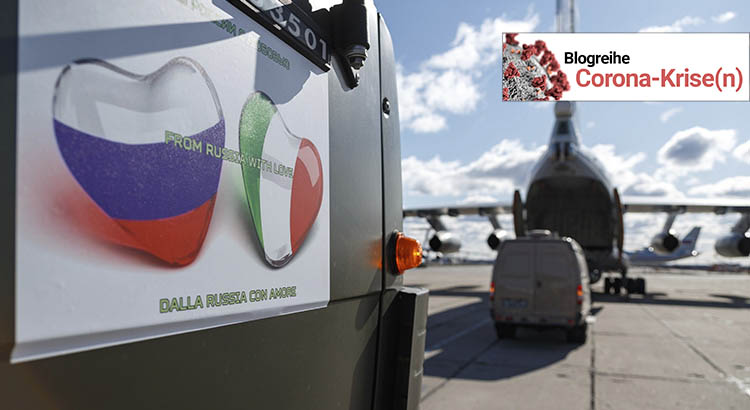For Russia the novel SARS-CoV-2 still seems to be the best of a bad lot, as the country still reports relatively low numbers of infected people. But, if coupled with other pre-existing problems (power transfer and economic hardships), the pandemic could exacerbate an already unstable situation and lead to new unpredictable foreign policy moves. Russia’s strategy in times of SARS-CoV-2 is most likely going to be threefold: further working on its global image by sending aid and offering assistance; shifting its focus from the near abroad to great power politics; and doubling up the ongoing information warfare if the first two do not bring immediate results.
A Friend in Need is a Friend Indeed
The images of Russian military medical personnel rolling down the streets of Italian Bergamo, sent to help the local government to fight the Corona epidemic left a mixed impression on the international community. The last time Russian soldiers stepped on the Apennine soil was more than 200 years ago, in 1799, during the second Coalition War against Napoleon. The Italian newspaper „La Stampa“ reported last week, that 80 percent of the medical equipment brought by the Russian specialists (mostly nuclear and biological officers of the medical branch of MoD) were hardly suited for fighting the pandemic. It is too early to draw conclusion on the long-term effects this action might have for Russia’s global reputation when it is all over. The novel SARS-CoV-2 virus, as the opinion piece of the leading thinkers in the Foreign Policy journal indicates, is likely to usher in “permanent shifts in political and economic global power in ways that will become apparent only later”.
The fact that Russia would send assistance abroad when it itself is facing huge challenges at home was far from certain. Currently we can discern at least three crises that the Kremlin is dealing with. First, there is an issue of power transfer that entered its first phase in January this year when the president announced the Constitutional reform (for more see “Lost in Transition”). Second, there is a domestic economic crisis, which has already been looming large for the last years but has now been exacerbated by the plummeting oil prices after Russia withdrew from the OPEC+ deal with the Gulf states (as a result, the Ruble lost nearly a third of its value before the coronavirus has become a global pandemic), which will be only catalysed by the possible global recession. Last, but not least, the country is starting to get wind of the pandemic too (approx. 6500 infected countrywide at the moment of writing), even though the authorities enforced preventive measures relatively early.
Using the Coronavirus for Boosting Global Image
Being perfectly aware that the Western countries are very unlikely to lift any Ukraine-related sanctions against Russia now, in the G20 leaders video conference meeting President Putin nonetheless proposed to lift the sanctions or at least introduce a moratorium on some of them for the time of the pandemic. Talking about restrictive measures, Putin specifically mentioned provisions-related sanctions, even though it is widely known that the West never imposed any such measures on Russia and it was the latter which introduced these as its “counter-sanctions”. Just a few days after Putin’s initiative, the Russian government suspended all its exports of grains due to the virus (Russia is the biggest exporter of it worldwide), which shows how inconsistent (not to say disoriented) Russian foreign policy is at the moment.
The case of Germany, France and the UK circumventing US restrictive measures on Iran to send vital medical equipment to Tehran, is clearly not the precedent Russia wants to use, as it realizes that all the restrictive measures against the regime stay intact. Clearly, the President’s suggestion was squarely aimed at boosting Russia’s international image and not at lifting the restrictive measures he himself had imposed.
From Regional to Great Power Politics
Russia‘s relations with its main geopolitical competitor, the United States, might also be significantly influenced by the pandemic. After a phone call with President Trump, Putin sent medical aid to the United States in the hope that Americans will be able “to reciprocate” if necessary. Whether in Syria, Ukraine or regarding the New START treaty (which expires in less than 11 months) – Russia is extremely dependent on the US readiness to play ball. And if relatively cost-neutral actions like the medical shipment bring about immediate media effects, we might see Russia’s stance towards the United States change even more significantly in the short-term. Consider for instance the step of Rosneft, the biggest Russian state owned oil company: it terminated all its activities and sold its shares in Venezuela after the US government imposed sanctions on two Swiss-based Rosneft units – Rosneft Trading and TNK Trading International. Considering the fact that Rosneft has been operating under sanction for more than five years now, this step might be interpreted as a token of good will towards the United States, especially as Washington recently decided to redouble its pressure on the Maduro regime.
The Russian “near abroad” policy, on the contrary, has been largely ignored so far (not to say fallen victim) due to the current crisis. For the first time Russia closed all of its borders, including those to the members of the Eurasian Economic Union (which enjoy Schengen-like mobility privileges among each other) as well as to its biggest ally, the Union Member State Belarus. This, however, does not preclude the Russian experts and media community to constantly accuse the EU of not “showing enough solidarity” in tackling the corona crisis. The mutual trust with arguably Russia’s biggest ally Belarus has suffered too. Relations between Moscow and Minsk have already been significantly undermined in the recent oil transit scandal in December 2019, and are now likely to deteriorate even further with the closure of the border. Belarus has become increasingly dependent on re-exporting sanctioned goods from Ukraine and elsewhere to Russia circumventing Moscow’s “counter-sanctions”. The Ukrainian conflict is also likely to be ignored for the foreseeable future. Notwithstanding some important positive developments in the Trilateral Contact Group, the scheduled meeting of the heads of states in the Normandy format in April 2020, which was agreed upon in Paris four months ago, will also be cancelled now.
Information War knows no Quarantine
Unlike in the ancient times, when the wars were stopped for the duration of the Olympic Games, the wars of the XXI century have no pauses or brakes (remember for instance the Russo-Georgian war in 2008, which started on the eve of the Beijing Olympics in August). As tens of millions of people are obliged to stay at home and follow strict quarantine rules, the importance of the media as the fourth branch of government to provide the public with precise and unbiased information, has grown exponentially. Against the background of an already ongoing information warfare between Russia and the West, the chances of its exacerbation under the current circumstances are extremely high.
The worrying reports of ongoing cyber-attacks and the disinformation efforts that (among others) are believed to originate in Russia, despite the coronavirus disruption, have already hit the headlines of newspapers. The elephant in the room concerning Russia, however, is the ambiguity which side Moscow is going to take in the stand-off of narratives between the USA and China. Whereas Beijing asserts that the US military could be responsible for the virus break out, Washington attempts to point fingers at China for initially underplaying the importance of the crisis. Until now, the Kremlin managed to distance itself from getting mired in this conflict, but it will hardly be able to keep it that way much longer.
Conclusions
If Russia is indeed facing a recession or, even worse, an economic default in the foreseeable future, the West will face the same dilemma it faced during the 1990’s, namely how to deal with a weakening Russia. Empirically, the most aggressive foreign policy rhetoric of the Russian president has been registered during the spikes in oil prices (see Snegovaya 2020), but practically it remains a mystery how to deal with today’s Russia, when its leadership does not consider the country to be “declining” or in any way “unequal” to the West, no matter the circumstances.
Coupled with a political and economic uncertainty at home, President Putin might become less risk-averse in an attempt to use the increasingly unpredictable global situation to score points in domestic politics. If the showing of good will in the form of medical shipments abroad does not produce immediate results (moratorium/partial lifting of sanctions), Russia could pursue a more hostile strategy, with disinformation campaigns becoming more frequent and the official rhetoric getting more aggressive.


